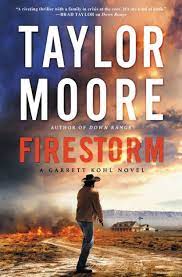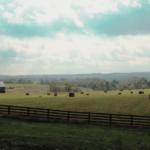Among the many tropes associated with the Old West, environmental activist hero isn’t one of them. But the world has transformed since the days of range wars, road agents, and train robberies and so have the dangers. If it wasn’t obvious before, then it certainly is now, that there is an unavoidable interdependence between metropolitan and rural America—and it’s all the more relevant due to the public’s focus on headline grabbing issues such as climate change.
In the twentieth century, totalitarian regimes like Nazi Germany, Imperial Japan, and Communist Russia arguably posed the greatest threat to human civilization. And fiction authors Jack Higgins, Tom Clancy, and John le Carré captivated readers with tales of air battles over Europe, submarine warfare in the Atlantic, and cloak and dagger liaisons behind the Berlin Wall. The fall of the Soviet Union gave us only a brief respite from worry over nuclear annihilation, as the dangers to world stability posed by foreign extremists soon took its place.
Terrorist attacks leading up to 9/11 effectively ended global concentration on the Iron Curtain, both in reality and in the world of fiction. And with this sudden shift, a new protagonist was born—one like many of us—who watched in horror and anguish as the Twin Towers fell. Americans felt as though they had a personal stake in the counteroffensive, craving justice, if not vengeance for the evil that was done. So, it wasn’t surprising that readers turned to books in order to better understand their enemy, and for catharsis in the aftermath of the tragedy.
Nearly a quarter of a century later, the dangers posed by foreign radicals seem to be overshadowed by the threat of ecological cataclysm, a worry that is particularly pressing for younger generations, who often approach climate change with the same fervor that their forebears attached to fighting fascism, foreign aggression, and the Global War on Terror. Future battlefields aren’t just overseas, but in the halls of congress, corporate boardrooms, and in the American West, where the region’s importance with regard to clean energy is growing.
Mining for rare earth minerals in places like Arizona, Nevada, Texas, and Wyoming make the West even more critical in technology development and national security. A single F-35 Joint Strike Fighter jet, for example, uses nearly a thousand pounds of these elements. Strategic defense aside, such materials are integral for generating clean energy, specifically in the production of wind turbines and in the manufacturing of electric vehicles.
Environmental issues or dilemmas as the crux of plot development in fiction writing, of course, is nothing new. Novelists John Grisham and Michael Crichton have shared these themes with enthusiastic audiences for decades. But a turn to the West, has not been significantly highlighted save a few exceptions. Notably, C.J. Box kicked off his Wyoming-based Joe Pickett series by tackling the topic of safeguarding endangered species, leaving readers eager for more.
My own Garrett Kohl novels, beginning with Down Range and Firestorm, are set on the rugged ranchlands of Texas and are heavily laden with issues concerning the protection of the vast rolling prairies and majestic Caprock Escarpment of the Llano Estacado. Despite the draw to the serenity of the untouched terrain, the area is known for function over form—its relevance based on its utility, which for over a century has been related to agriculture and hydrocarbons.
Given its remoteness, the Texas High Plains has become home to more than a few largescale livestock feeding operations, processing facilities, and petroleum refineries—not exactly the kind of manmade attractions that typically draw the Aspen crowd. But this peculiar juxtaposition of industry and nature makes for great fiction and reels in conflicted readers, who are beneficiaries of the often not-so-green bounty. The not in my backyard themes running through the books pose serious food for thought, especially with the NIMBY crowd.
Even Dan Brown, author of The Da Vinci Code, would be envious of the natural conflict already built into these stories. Like the science and religion argument, the environmentalism against capitalism debate makes for a wonderful man versus society dilemma, and a terrific crucible for protagonists. It runs the spectrum of the human hierarchy of needs—starting with basic survival and moving on to critical questions of self-actualization. Who we are as a society—saviors or destroyers? And do the needs of the many outweigh the needs of a few?
Stories concerning the ecological and ethical use of natural resources affect us on a physical, mental, and spiritual level—cutting not only to the core of our moral beliefs, but to our instinct not to only live, but to thrive. Throw in a few crooked politicians, greedy CEOs, and gun wielding thugs, and a plot is well on its way. Add in a sympathetic and relatable protagonist at the mercy of these bad guys and you have an embarrassment of riches as an author.
Given our interdependence as a global society, a problem for one is now a problem for all. Many urbanites, once content with a passing glance at the hinterlands below from a commercial airliner at thirty-five thousand feet are suddenly eager for a closer look. Terrain that might have once derisively been referred to as flyover country, is not only politically and socially relevant, but it’s also alluring, mysterious, and exciting. Maybe even a little dangerous.
The cherry on top for readers is that the American West is accessible. Unlike novels set in faraway lands and restricted warzones, one can simply pack up the car and head out to visit a protagonist’s stomping grounds, and even eat at a character’s favorite restaurant to take in the local color. The possibility exists not only to learn about the region’s rich history, but to jump into the pages, become a part of it, and maybe even experience a shared adventure or two.
As green issues become more pressing and predominant with future generations, these storylines will continue to pop up in unexpected places like the neo-western. And as long as there are villains exploiting resources or just poisoning the planet for the old-fashioned fun of it, don’t be surprised if the environmental activist hero standing between the mustache-twirling villain is a Stetson-clad cowboy—saving the day—and maybe even rescuing the world.
*


















